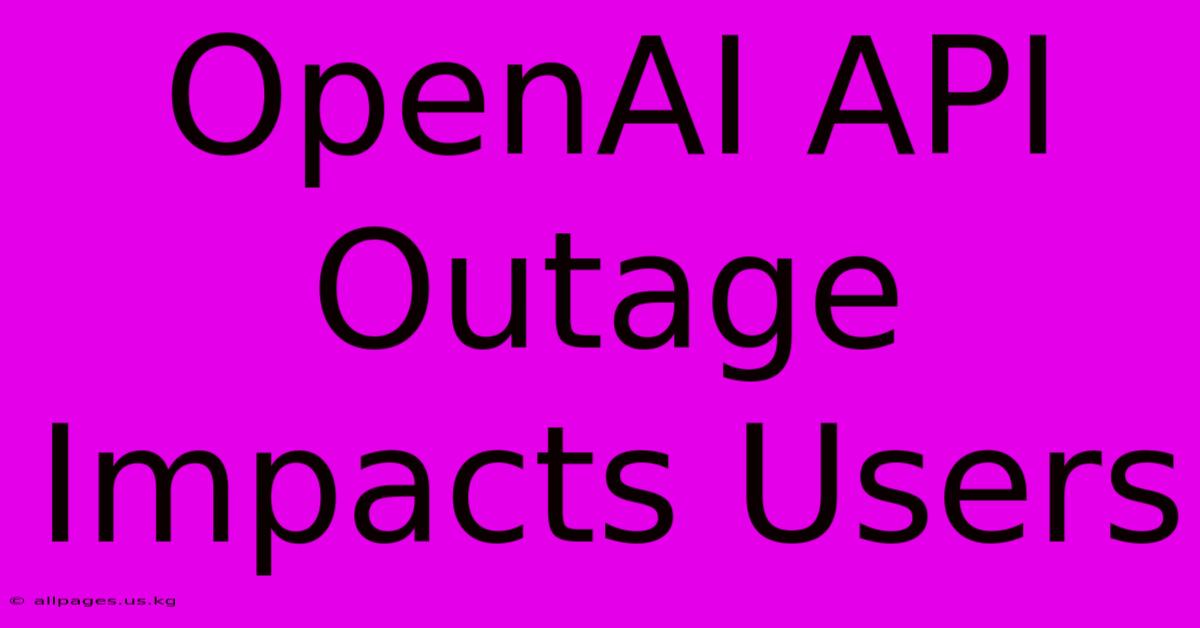OpenAI API Outage Impacts Users

Discover more detailed and exciting information on our website. Click the link below to start your adventure: Visit Best Website allpages.us.kg. Don't miss out!
Table of Contents
OpenAI API Outage Impacts Users: Understanding the Downtime and Its Effects
The OpenAI API, a powerful tool for developers integrating AI capabilities into their applications, recently experienced an outage. This disruption caused significant impacts across various sectors, highlighting the increasing reliance on AI infrastructure and the potential consequences of service interruptions. This article delves into the details of the outage, its effects on users, and what we can learn from this event.
Understanding the OpenAI API Outage
The recent OpenAI API outage lasted for [Insert Duration of Outage Here], affecting a broad spectrum of users. While OpenAI hasn't publicly specified the exact cause, possible reasons range from server overload to unexpected infrastructure issues. The lack of immediate and detailed communication during the outage heightened concerns for many developers.
Who was affected by the OpenAI API outage?
The impact spread far and wide, impacting businesses and individuals alike. Here are some key affected groups:
- Businesses relying on AI-powered applications: Companies using the OpenAI API for chatbots, content generation, code completion, and other AI-driven services faced disruptions, leading to potential revenue loss and customer dissatisfaction. Imagine a company whose entire customer support system is powered by an OpenAI-driven chatbot – an outage is catastrophic.
- Developers integrating the API into their projects: Developers whose projects relied on the OpenAI API experienced significant setbacks. Workflows were interrupted, testing was halted, and deadlines were potentially missed. This caused delays in product launches and increased development costs.
- Researchers using OpenAI models: Researchers conducting experiments and studies utilizing OpenAI models were also impacted, potentially affecting their research timelines and data collection efforts. The disruption disrupted critical workflows and could have skewed research results.
The Ripple Effect: Consequences of the Outage
The consequences of the OpenAI API outage extended beyond immediate service disruption. The ripple effects were felt across various aspects:
- Financial Losses: Businesses experienced direct financial losses due to downtime, lost productivity, and potential customer churn. The cost of recovery and regaining lost trust also adds significant financial burdens.
- Reputational Damage: Companies heavily reliant on the OpenAI API experienced reputational damage if they failed to communicate effectively with their users about the outage and its impact. Transparency and proactive communication are key during such situations.
- Development Delays: Developers experienced significant project delays, impacting product launches and overall development timelines. This ripple effect cascaded to other dependent teams and projects.
- Erosion of Trust: The outage, especially if communication from OpenAI was lacking, could erode trust in the API's reliability and stability, leading to users seeking alternative solutions.
Lessons Learned and Future Preparedness
The OpenAI API outage served as a stark reminder of the importance of:
- Redundancy and Failover Systems: Implementing robust backup systems and redundancy measures is crucial to minimize the impact of future outages. Having multiple data centers and failover mechanisms is essential.
- Transparent Communication: Open and timely communication with users during outages is paramount. Keeping users informed about the situation, its cause, and the expected recovery time is critical for maintaining trust.
- Disaster Recovery Planning: Companies should have comprehensive disaster recovery plans in place to address potential service interruptions and ensure business continuity. This involves regular testing and updates to the recovery plan.
- Diversification of AI Infrastructure: Relying solely on a single AI provider carries inherent risks. Diversifying to multiple providers can mitigate the impact of outages from a single source.
In conclusion, the OpenAI API outage highlighted the vulnerabilities inherent in our increasing reliance on AI infrastructure. By learning from this experience and proactively implementing robust contingency measures, both OpenAI and its users can better prepare for and mitigate the impact of future disruptions. This event underscores the need for greater resilience and transparency in the rapidly evolving world of AI.

Thank you for visiting our website wich cover about OpenAI API Outage Impacts Users. We hope the information provided has been useful to you. Feel free to contact us if you have any questions or need further assistance. See you next time and dont miss to bookmark.
Featured Posts
-
Chelsea 1 2 Fulham Player Ratings And Review
Dec 27, 2024
-
Wordle Hints Answer 1287 Friday
Dec 27, 2024
-
Kansas State Vs Rutgers 2024 Rate Bowl Prediction
Dec 27, 2024
-
190 Post Christmas Deals 2024
Dec 27, 2024
-
Larranaga Steps Down From Um Coaching
Dec 27, 2024
